DIACONATE PROGRAM
The vocation to the permanent diaconate is a supernatural call that comes from God himself. It is an invitation that comes from God through the Church for a man to become conformed to Christ the Servant in order to live out the corporal and spiritual works of mercy in a radical way through the ministries of the liturgy, the word, and charity.
The Diocese of Nashville is blessed with many outstanding permanent deacons that have left a legacy of Christ-like service. These men serve in parishes and other ministries across the Diocese and play an important role in our local Church. As we look to the future in a vibrant and growing Diocese, we hope that a new generation of men will rise up to answer God’s call and continue the mission of serving His Church.
What are the minimum requirements to become a deacon?
The most fundamental requirement to become a deacon is to receive a vocation (calling) from God. No one can take this ministry upon himself. The invitation to be consecrated for the Church’s ministry comes from God and is evaluated and nurtured by the diocesan bishop and those the bishop designates to assist him. To receive this invitation the candidate must be a single or married man in good standing in the Catholic Church and must be at least 35 years old by the time of ordination. The Diocese of Nashville also requires that the candidate either hold a bachelor’s degree (in any subject) or be bilingual.
How do I know if God is calling me to be a deacon?
Because it is a call from God, a vocation to the permanent diaconate is something that must be discerned in prayer. The man should also consider whether he shows signs of the natural and spiritual gifts necessary for this life. These gifts are centered around the corporal and spiritual works of mercy. Practically speaking, he should spend time praying with those lists of charitable works and ask God if he is being drawn to radically give himself in that way. As he begins to think about it more seriously, he should also talk to his family and friends. Often those closest to him will see gifts in him that he may not initially recognize in himself.
How does one become a deacon?
Before ordination to the diaconate, a man must undergo four years of formation and preparation. In the Diocese of Nashville this formation takes place one weekend a month during the academic year.
What does a formation weekend involve?
The Office of Vocations and St. Meinrad Seminary’s Permanent Deacon Formation Program work together to organize the formation weekends. These weekends include an intensive theological course such as Church History or Christology, communal prayer involving the Liturgy of the Hours and Eucharistic Adoration, and a formation conference that focuses on some of the practical skills necessary for diaconal ministry. Each weekend’s program begins on Friday evening and ends on Sunday afternoon.
What are the requirements outside of these formation weekends?
Outside of the class time provided on a formation weekend, each course demands a significant amount of work. Although the workload varies by subject, a typical class might require 4–12 pages of writing and 300–700 pages of reading per month. Additionally, those candidates who already have a bachelor’s degree are asked to complete another 18 hours of course work through St. Meinrad in order to obtain a master’s degree in theology.
Is there a financial cost for the program?
The Diocese of Nashville covers all of the program and course costs associated with diaconate formation. At the same time, there is an expectation that those who are being called to leadership in the Church in a prominent way be models of generosity and prudent financial stewardship. Candidates for the permanent diaconate should faithfully and consistently provide for the needs of their parish and of the Diocese as a whole.
Where can I get more information?
If you would like any advice or guidance on discernment or would like more information on the diaconate program please feel free to contact the Office of Vocations or to visit St. Meinrad’s website.
How do I apply?
When a man feels confident that he would like to begin the application process he should contact the pastor of his home parish to take the first step.

